
It’s that time again when I look back on the books I read the previous year and rank the top ten. It’s a silly exercise on my part, yet I enjoy it. I like reviewing what I read the previous year, reliving the experience of reading the great books, and even remembering those that didn’t live up to expectations.
This year’s list includes eight works of fiction and two nonfiction books. I read primarily fiction, so the split between fiction and nonfiction really shouldn’t be a surprise. As in past years, I’m ranking books I read during the year, not books that were published during the year. I’d love to be so caught up on my reading that I could limit myself to only books recently published. There were a lot of great books published in 2018, but since I’m still trying to work my way through books from previous years (even previous decades), I likely won’t get to them all for a while.
I read a lot of really good books in 2018. When I compiled my list, I had too many books to choose from, so I had to whittle the list down to just ten. But they are ten really good books.
As in previous years, there were a few books that disappointed. And sadly, two of the three disappointments were from authors I admire and normally like to read.
I should point out that these books I’m listing as disappointments were not necessarily bad books. In fact, all were okay, three stars out of five. But I had very high expectations of all three, and they all disappointed. Having said that, let’s get to the disappointments.
The first is The Keep by Jennifer Egan. I love Jennifer Egan’s writing. Her book, Manhatten Beach made last year’s list. A Visit From the Good Squad is one of my all-time favorites, and she has another book on this year’s list. But The Keep just fell flat for me. It’s characters were unlikable, the plot was contrived, and it left me disappointed. Make no mistake about it, Jennifer Egan is a great writer, but even great writers sometimes produce a dud. For me, The Keep was a dud.
Rachel Kuschner also hit a sour note with her latest, The Mars Room. The story was too slow, the stakes too inconsequential, and the characters were often too cliched. Rachel wrote one of my all-time favorites, The Flamethrowers, so I know what a capable writer she can be. Unfortunately, The Mars Room didn’t display her wonderful skill as a storyteller.
Finally, I was really looking forward to reading Jason Mott’s The Returned. It has a great plot idea: people who died years earlier begin returning to life. They aren’t ghosts or zombies. They are the same people they were when they died. And when they return, they have no memory of their death or where they have been in the intervening years. Sounds great, right? Unfortunately, Mott’s execution on the idea leaves a lot to be desired. Some characters accept the returned. Some reject them, even resorting to violence. But what the characters don’t do nearly enough of is question where the returned have been or why they’ve returned. In fact, the returned don’t really question how they died, where they’ve been, or how the world has changed in the years since they died. It seems only natural that everyone involved would want these answers, but Mott just glosses over it. The Returned could have been a great book, but it turned out just okay.
Now to the top ten books (I read) of 2018:
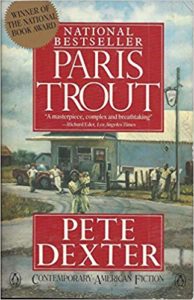
10. Paris Trout by Pete Dexter – Pete Dexter is a terrific writer. In addition to Paris Trout, I read Brotherly Love ,which just missed making this year’s top ten list. Dexter also wrote one of my all-time favorites, Deadwood. Paris Trout was published in 1989 and takes place just after World War II. It deals with the murder of a young African-American woman in a small Georgia town, and includes all of the racial prejudice and hatred you’d expect. What I didn’t expect was how much these racial feelings from more than seventy years ago still feel fresh and raw today. Dexter’s writing, as always, is straight forward and unadorned, but powerful and compelling. It took me twenty-nine years after publication to read Paris Trout, but it was worth the wait.
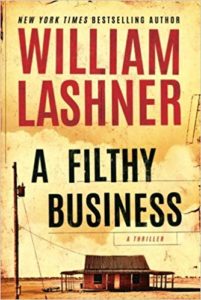
9. A Filthy Business by William Lashner – When I choose a book to read, it usually is recommended to me by a friend, is talked about on social media, or is written about in an article. I don’t have any memory of how I came to know about William Lashner’s A Filthy Business. To the best of my knowledge, I had never previously heard of William Lashner (a former attorney and graduate of the Iowa Writer’s Workshop), nor had I heard anything about A Filthy Business or any of Lashner’s other books. How I came upon the book is a mystery. Even so, I’m glad I did. A Filthy Business tells the story of Phil Kubiak, a sociopath who questions his actions, even as he kills, cheats, and steals. The story is told from the prospective of Phil as he is giving an interview to a journalist. The writing is gritty, the characters are complex (although sometimes over the top), and the story keeps urging the reader forward. I have a few qualms with A Filthy Business, but it still makes this year’s top ten list.
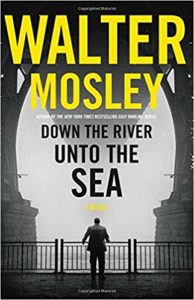
8. Down the River Unto the Sea by William Mosely – Walter Mosely is an incredibly accomplished writer. His books and short stories have earned him an O. Henry Award, Anisfield-Wolf Book Award, Pen-America Lifetime Achievement Award, and for good measure, he’s also won a Grammy Award. Down the River Unto the Sea is a crime drama written with a literary eye. It tells the story of a former NYPD cop, Joe King Oliver, who was framed for a crime he didn’t commit, spent time in prison, and is back on the streets working as a private detective. He’s trying to earn a buck while looking out for his daughter and re-married ex-wife when he receives a letter from the woman who framed him. She admits she lied, but all Oliver wants to know is, who put her up to it. As he works to clear his name, he’s also fighting to prove that a young journalist isn’t the one who killed two on-duty cops. Down the River Unto the Sea is not a perfect book, but it’s well worth the read.
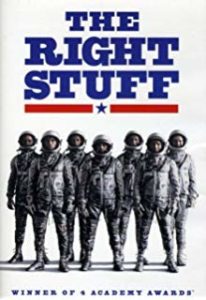
7. The Right Stuff by Tom Wolfe – I’m almost embarrassed to admit that I didn’t read The Right Stuff until 2018, thirty-nine years after it was first published. The Right Stuff tells the story of the first Apollo astronauts, and some of the characters that worked in and around NASA (and the military) during those early days of the space program. Wolfe is a master storyteller, weaving the tales of several different people as they march toward a career in NASA, and when they come together as astronauts and friends. Wolfe’s book is different than the movie that was made from it (which was fantastic). The movie is a straight forward chronological telling of the early days of the Apollo program. Wolfe’s book jumps around more, goes on more tangents, and tells more about the danger and deaths faced by the early astronauts. At times, the book is darker, less optimistic and more personal than the movie. Both are great. If you haven’t seen the movie, you should. If you haven’t read the book, I recommend it. Nearly four decades after it was published, The Right Stuff is still a great read.
 6. A Thousand Acres by Jane Smiley – A Thousand Acres was first published in 1991 and was awarded The Pulitzer Prize for Literature the following year. It tells the story of Larry Cook, an aging Iowa farmer who turns control of his farm over to his three daughters, none of whom particularly want the farm. The gift creates a rift between the father and daughters, between the daughters and their husbands, and between the sister themselves. Smiley does a terrific job of contrasting the beauty and starkness of the land and the lifestyles led by farmers. Ninety percent of the book is fantastic, but there’s one plot point that I have to discuss. The three sisters are typical Iowa farm daughters. One enjoys the farm (or so it seems), one hates the farm, and one has moved away from the farm to the big city (Des Moines) to practice law. These three woman are people you know, maybe even people you are. So it is jolting when one of the women decides to kill her sister. This revelation came out of left field and was completely out of character for the woman. I’m not sure why Smiley decided to turn this woman from mild-manner and people-pleasing to homicidal, but it went over like a lead balloon. Obviously, the Pulitzer committee felt otherwise, but for me, this small part of the story (and to be sure, it is just a small part of the story) stuck out and tainted the book. Even so, A Thousand Acres is still a terrific read.
6. A Thousand Acres by Jane Smiley – A Thousand Acres was first published in 1991 and was awarded The Pulitzer Prize for Literature the following year. It tells the story of Larry Cook, an aging Iowa farmer who turns control of his farm over to his three daughters, none of whom particularly want the farm. The gift creates a rift between the father and daughters, between the daughters and their husbands, and between the sister themselves. Smiley does a terrific job of contrasting the beauty and starkness of the land and the lifestyles led by farmers. Ninety percent of the book is fantastic, but there’s one plot point that I have to discuss. The three sisters are typical Iowa farm daughters. One enjoys the farm (or so it seems), one hates the farm, and one has moved away from the farm to the big city (Des Moines) to practice law. These three woman are people you know, maybe even people you are. So it is jolting when one of the women decides to kill her sister. This revelation came out of left field and was completely out of character for the woman. I’m not sure why Smiley decided to turn this woman from mild-manner and people-pleasing to homicidal, but it went over like a lead balloon. Obviously, the Pulitzer committee felt otherwise, but for me, this small part of the story (and to be sure, it is just a small part of the story) stuck out and tainted the book. Even so, A Thousand Acres is still a terrific read.
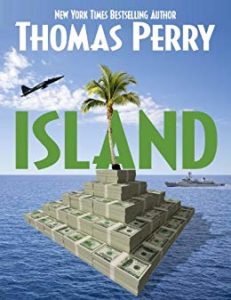
5. Island by Thomas Perry – Island is a Carl Hiaasen-like romp through the Caribbean. At least, that’s how the book is promoted. I didn’t know about the promotional tagline when I started reading. In fact, I didn’t know anything about the book when I started reading other than that it took place in the Caribbean. And oddly, after reading the book, I didn’t think of it as a Hiaasen-like story, although I now see the resemblance. The characters are a bit wacky and the situations a little out there. But unlike Hiaasen, the characters are not over-the-top wacky, the situations are not way, way, way out there, and maybe best of all, the writing is not frenetic. When I read Hiaasen, I feel a bit like I’m being assaulted. Everything is too much, and it’s all coming too fast. With Island, I could enjoy the story, allow the characters to be a little wacky, but still root for them. And best of all, I could enjoy the story without feeling like I had to completely lose my grip on reality. Island was originally published in 1987, but to me, it didn’t feel dated or of a different time. The characters were fresh and well-rounded, and the story walked the edge of belief without crossing over the line.
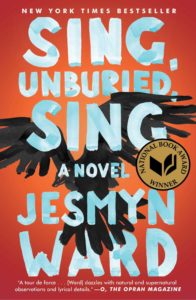
4. Sing, Unburied, Sing by Jesmyn Ward – Jojo is a thirteen-year-old boy growing into a man. His father is white and in prison. His mother is black and puts her need for drugs ahead of Jojo’s and his sister’s needs. His white grandfather won’t acknowledge his existence, and he is tormented by his black uncle’s death as a teenager. When his father is released from prison, Jojo’s mother takes him and his sister to Parchman Prison in Mississippi to retrieve a father they barely know. There, Jojo meets the ghost of a thirteen-year-old boy who died in the prison and carries much of the ugliness of the south in him. The writing in Sing, Unburied, Sing is beautiful. Ward tells a great story, but also excels on the sentence level. I enjoyed this book very much, but I have to admit that the introduction of the ghost lessened my enjoyment. I found the ghost to be a bit of a gimmick, and at times, the characters became a bit cliched. Even so, Ward’s writing was strong enough to keep me engaged. In the hands of a lesser writer, Sing, Unburied, Sing could have turned into a train wreck, but Ward was able to bring it home in good shape.
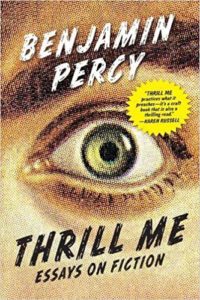
3. Thrill Me: Essays on Fiction by Benjamin Percy– This book won’t appeal to most readers. It’s a craft book on writing. But for me, it was fantastic. In it, Percy details his philosophy on fiction writing. He discusses the difference (or lack of difference) between commercial fiction and literary fiction (one of my favorite topics) and writes about the importance (or necessity) of literary fiction accepting and adopting some of the plot devices common to commercial fiction. In particular, Percy says that literary fiction needs to get off it’s high horse and accept that readers want suspense and intrigue and thrills in the books and stories they read. This is something I have campaigned for for a long time (which is one reason I think Percy’s ideas are genius). As literary writers, we need to understand that readers don’t want to read a slow moving story where the stakes are low. They want to be pulled through the book by the story AND the writing. Pretty writing isn’t enough. Literary writers need to pay attention to plot and story. In the immortal words of author Bret Anthony Johnston, if you want to write a book without a plot, you might as well write a poem. (I’m paraphrasing)

2. The Invisible Circus by Jennifer Egan – Originally published in 1994, The Invisible Circus tells the story of Phoebe, a young woman haunted by the death of her popular and free-spirited sister. Phoebe is the product of a dysfunctional family. She lives with her mother, a divorced woman trying to make it on her own. Her father is only a memory, and her wealthy brother, an inconsistent and misunderstood presence in her life. Then there’s her sister, the beautiful hippie girl that everybody loved, but who disappeared to Europe and wound up dead. Phoebe ventures to Europe to find out the truth about her sister, falls in love with her sister’s former boyfriend, and ultimately learns a truth she’d rather not know. Egan is brilliant in this book. Her writing is as good as it gets. Her characters are insightful and nuanced, and her story is compelling. This is the Jennifer Egan I came to know in A Visit from the Goon Squad and Manhatten Beach. The writing is tight and full of humor and suspense. Definitely one of my favorite books of the year.
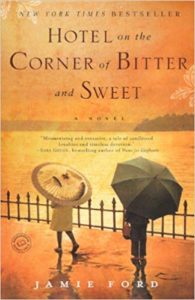
1. Hotel on the Corner of Bitter and Sweet by Jamie Ford – For Christmas 2017, my friend, Beth Ramsay, gave me Hotel on the Corner of Bitter and Sweet. In exchange, I bought her dinner. I got the better end of that deal. Jamie Ford has crafted a brilliant debut novel in Hotel on the Corner of Bitter and Sweet. In it, he tells the story of Henry Lee, a Chinese-American living in Seattle. When the old Panama Hotel, which has been boarded up for years, is sold and about to re-open, workers find the belongings of several Japanese families who were sent to internment camps during World War II inside. Henry was once very close with the daughter of one of those families, the Okabes. Henry makes it his mission to return the belongings to his friend, a woman he still has feeling for. But where is she? Is she still alive? And how will she react when she sees Henry? All questions are answered in this fantastic book. Thank you for the gift, Beth. It was wonderful.
